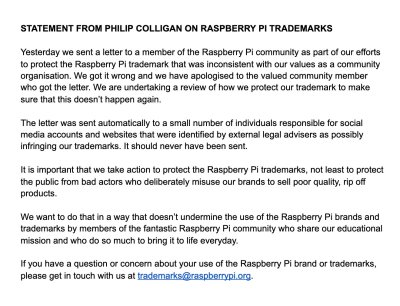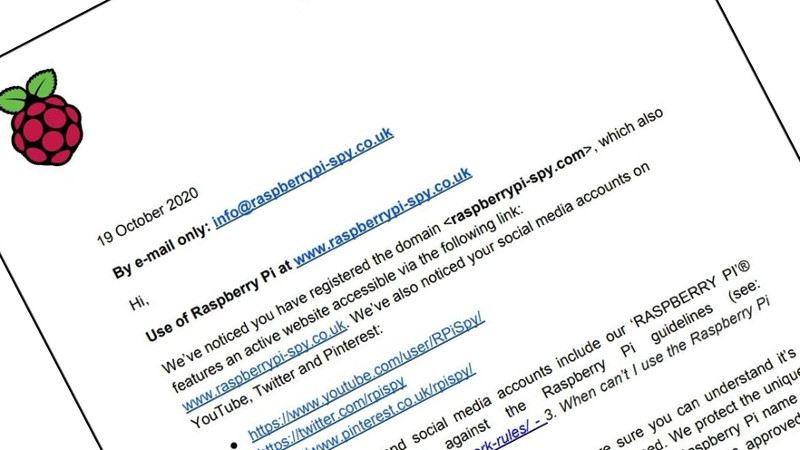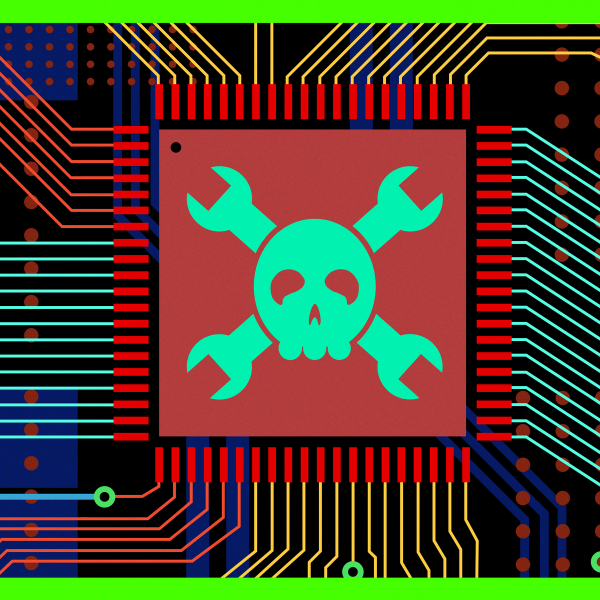In the eight years or so since the Raspberry Pi first landed as tangible hardware, we’ve all dealt with the Pi folks whether as customers or through their many online support and outreach activities. They’ve provided our community with the seed that led to an explosion of inexpensive Linux-capable single board computers, while their own offerings have powered so many of the projects we have featured here. Their heart lies in their educational remit, but they have also become an indispensable part of our community.

Thus it was a surprise when [Raspberry Pi Spy], a long-time commentator on all things Pi, received a legal notice from the Raspberry Pi Foundation that their use of the Raspberry Pi name contravened the acceptable use guidelines and demanding that all content be removed and the domains be handed over. Some consternation ensued, before Pi foundation boss [Philip Colligan] released a statement retracting the original letter and explaining that the incident was the result of an over-zealous legal adviser and that the Foundation has no wish to undermine the Pi community.
All’s well that ends well, but what just happened? In the first instance, it’s natural for any organisation to wish to protect their brand, and there would be plenty of unscrupulous entities ready to sell fake Pi products were the Foundation not active in asserting their rights. In this case it seems that it was the use of the full Raspberry Pi trademark in a domain name that triggered the letter and not the fair-use blogging about the Pi products. We can see that however much we might wish otherwise it was not without legal merit. There have been numerous cybersquatting cases heard since the creation of the Web, and even though some of them have been on more dubious ground than others it remains a well-trodden path.
Where this story differs from so many others though is that the Pi Foundation acted with common sense in withdrawing the notice issued against a member of its community. It is inevitable that sometimes even the best of us can take regrettable paths by whatever means, and respect is earned by how such situations are resolved. We applaud the Pi folks for their swift action in this matter, we’d suggest to anyone that they take care when registering domain names, and we suspect that somewhere a legal adviser will be in the doghouse. But that all such incidents in our community could be resolved with such ease.
















Shit happens. It’s how you clean up the turds that matters. Well Done RPi Foundation!
Agreed! I like how quickly this got resolved. You can tell the RPi folks care about the community.
The initial impulse to protect branding to indicate genuine products in not unreasonable. RPF should consider using open-use and restricted-use logos similar to Debian.
It’s good they got ahead of this quick. I can imagine their market share would have tanked hard if this had gone forward. Hackers tend to be anti-corporate / anti-mainstream. I for one would not have bought another pi nor recommended them to others. I would have told everyone to avoid them as I tell everyone to avoid every evil corporation. “Overzealous” is not quite the correct word for that legal advisor. “Inept” or “unable to understand one’s job” are better descriptions. I wonder if they get a bonus for every infringement taken down…
The DoJ has filed suit against Google.
It won’t go anywhere…Trust me. The government needs money right now. This is just an inconspicuous way to get a donation from Google.
I could not agree more.
Typical lawyer. Completely myopic, paranoid, “just doing my job,” looking to demonstrate that he’s earned his (probably ridiculously inflated paycheck).
Congrats – you did the opposite.
I get that lawyer bashing is fun but we provide an important service to society. Everything from protecting your human rights and stopping your neighbour dumping rubbish in your garden to preventing a company ripping off your product.
Many lawyers are also not paid particularly well. The pay for a criminal barrister in the UK is often lower than the statutory minimum wage due to the hours of prep and personal expenses involved. Despite what you may believe, most of us are publicly minded – I have spent much of the COVID pandemic preparing free Wills for front line healthcare workers.
Every profession has its bad apples but the “typical” lawyer is not as you describe.
More proof that there are too many lawyers in this world.
And the off-leash ones are the worst, dropping turds like that.
Agreed. This legal advisor nearly destroyed their organization.
The lawyer did something that is perfectly legal, protecting trademarks is important. You might want to understand how the “law” works. This wasnt something “evil”
Good and evil, you can leave aside. But the claim is kinda weak.
I don’t know UK law as well as US, but the gist of international trademark law is to prevent confusion — and here that’s about whether or not you’d think that “Raspberry Pi Spy” was an official RPi outlet. I’m going with “spy” pretty much projects that they’re on the outside looking in.
It’s not open-and-shut. Hell, Apple seems to be able to ban people from using fruits on any piece of electronics. (Wasn’t there something with a pear?)
Here, the issue is that a law firm sent out “automatic” scare letters. That’s almost always the wrong thing to do. But it’s cheap and lazy!
… and before that “Apple” (McCartney) tried to stop “Apple” (Jobs).
But the latter promised not to work in the Music market, and all was smoothed over….
True story: We had a customer’s shipment of Smiley Face T-shirts confiscated and destroyed by German customs for violation of a UK copyright. Turns out what everyone can freely use in the US is restricted because of a completely separate UK holder. Likewise, the critics here saying the lawyer’s action would have doomed the company, well, they’re as hyperbolic as the lawyer they condemn. Must be twitter users.
The good old confusion between morality and legality. Slavery was legal, and so is DRM (which I think most of us on this site detest, unless we’re working in an industry where it’s perceived as beneficial). The Underground Railroad and publishing the DVD key were illegal, but I think they were unambiguously a good thing (letting enslaved people go free in the first instance, letting people protect their investment in their treasured copies of films in the latter).
Henry VI, Part 2, Act IV, Scene 2
I have the greatest of respect for people who can swallow their pride, and admit that there was a mistake, and make a good apology for it!
It reminds me of the CS Lewis quote that when things are going the wrong direction the first person to turn back is in fact the most progressive.
Well done Raspberry Pi Foundation!
I heard the rumour that the Pi proprietary bootloader had actually some code copied from u-boot.
without any proof this is just baseless and nasty accusation, are you aware of that?
And BTW it is also quite unlikely – both because how they typically treat licenses and contribute back ( to kernel, mesa, …) and technically the u-boot codebase would not give them anything significant they didn’t have before, lot is native videocore broadcom code, dates back to first Pi released in 2012 or even much earlier
Uboot surely contains a lot of useful things to make a bootloader. Filesystem modules, flash/mmc drivers, … But it seems unlikely that they copied it since this is all available as bsd code from other sources
There is no uboot code in the Pi bootloader. The rumour is just that, a rumour unaccompanied by actual fact.
Many people don’t appreciate a key difference between trademarks and copyrights, patents and other IP nonsense: use it or lose it!
Unfortunately “use it” is not limited to simply actively using it yourself, you actually also have to actively defend it from infringement. If you don’t defend it, after some time it becomes free to use by others and you can’t defend against bad misuse anymore (eg sub par “Raspberry Pi” branded clones).
Organisations like Debian, Ubuntu, Raspberry Pi or Mozilla defending their trademarks is actually in our (i.e. the hacker community’s) best interest. (As long as the system is not changed)
That said, you don’t lose it if you can show that the infringement you did not defend against was minor. That’s where this lawyer’s misjudgement and the CEO’s open letter come in.
PS: IANAL
Granting permission is sufficient defense of your trademark not to lose it.
Not as profitable to your IP firm though.
Which, if I’m not mistaken, is effectively exactly what the RPF now have done isn’t it?
The point I was trying to make is: the RPF are not traitors to the cause just because they defend their trademark. They have to do that, and also we benefit from that.
If they do overreact, as they’ve done in this case, they show their true colours in how they react in the aftermath.
From where I’m sitting, they’ve done the right thing.
The real infingement takes place in countries like china, russia, etc. where lawyers and law from western countries have no reach – so the buccaneer lawyers rather shoot into the flock – every little helps
You can register patent/trademark in Russia too. Just that you’ll need to enforce it by the country’s laws. Most companies do not bother.
So – please, avoid painting with broad brush here.
I think they did the right thing letting this one go because this is a community that would turn on them for something like that,. And usually I agree with the community about these things.
But this time I’m not convinced the lawyer was wrong.
They did have the entire Raspberry Pi name in their own. Was that really necessary? How many of us, if making a new product would think that taking an existing brand name and just adding one short single-syllable word to it was a good idea? I know I wouldn’t.
And it’s not like the lawyer tried to stop them from producing or marketing their product. It was only about the name. A rose by any other name… right?
I really hope the community continues the fight to keep corporations from locking us out of technology with things like DRM, obvious patents, “with a…” patents or endlessly renewing patents with trivial modifications and all the other nasty tricks they use. But maybe we can be a little better about not doing things like taking each other’s names? It’s going to be easier to fight those battles if we keep to the high ground.
Semtech (company behind LoRa chips) should take not on this.